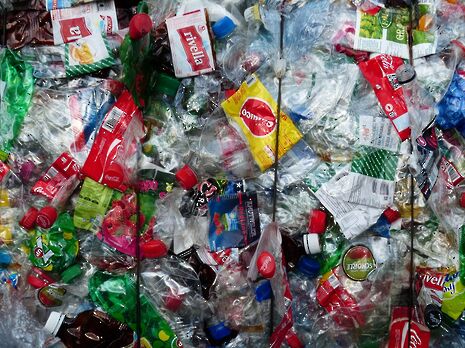Are your recycling habits really helping the planet?
Sophie Cook discusses some common recycling mistakes, and how to avoid them

Plastic is quickly becoming the new public enemy number one. We are becoming increasingly aware of its impact on the environment, particularly on marine ecosystems. We have all grimaced at images of turtles eating supermarket bags or seabirds with stomachs full of microplastics. With so many people wanting to do their part and reduce their plastic consumption, I thought I would bust some myths and common misconceptions around plastic and its recycling process.
The rapid growth in plastic production began in the 1950s, and since then, we have seen a 200-fold increase in annual production rates. By 2015, we had produced a staggering 7.8 billion tonnes of plastic – more than one tonne for each person alive on the planet today. While sometimes this has been for the better (for example, it has massively extended the shelf-life of food), it has facilitated the growth of a disposable society where too little thought is given to what we consume.
In 2015, 55% of global plastic waste went straight to landfill, 25% of it was incinerated and 20% recycled. Of all the plastic waste produced since 1950, only 9% has been recycled. Unfortunately, it is a common misconception that most plastics can be recycled many times over. More often than not, due to the intensive thermal processing procedures used, most plastics can actually only survive being recycled once or twice.
“So on your next visit to Mainsbury’s, be mindful of the black tray lurking beneath your tomatoes”
When you recycle plastic, it is first sorted by machines based on plastic type and colour. It is then washed to remove impurities before being shredded into small particles. These are then separated by density, melting point and colour before being compounded and melted together into plastic pellets for reuse. One of the major problems with the UK recycling system is its vulnerability to contaminants. Putting non-recyclable items in your recycling bin can cause cross-contamination, which can lead to recyclable items being rejected and sent to landfill. Government figures show that between 2012 and 2016, there was an 84% increase in the amount of rejected UK household recycling.
A survey by Anglican Home Improvements found that 99% of British people claim they ‘actively recycle’. However, a staggering 70% are unaware of what they can and cannot recycle. 27% of us think that you can recycle greasy pizza boxes and crisp packets. Considering we each produce around 412 kg of waste per year, getting our recycling habits sorted would make a massive difference.
Common offenders which people shouldn’t be recycling include:
- Greasy pizza boxes
- Polystyrene contaminated with your late-night takeaway
- Coffee cups (most high street chains line their cups with plastic)
- Crisp packets
- Straws
- Post-it notes
On the other hand, items which more people should recycle are:
- Metal lids on glass jars – as long as they are separated from the glass
- Plastic bottle tops – as long as they remain on the empty bottle
- Clean kitchen foil
- Empty deodorant cans
- Envelopes – if you remove the plastic window
- Clothes – over one quarter of all clothes in the UK end up in the bin; if your unwanted clothes are unfit for donation to a charity shop, they can actually be recycled
The black plastic trays commonly used by supermarkets also cause a problem in our recycling system. These trays are often used as food packaging as their dark colour makes food stand out and look more appealing. This tactic obviously works as it is estimated that UK households produce 30,000 to 60,000 tonnes of black plastic packaging waste each year. However, most UK recycling centres use infrared sorting machines which cannot detect the dye used in these black plastics. Only 22% of UK households can actually recycle them.
While recycling effectively is important, as consumers we should still be looking to consume less overall. Since the 5p plastic bag charge was introduced across the UK, our consumption of single-use plastic bags has decreased by 80%. This is clear evidence that consumers do want to do their part and will do so if appropriately incentivised. The packaging industry is responsible for the use of 42% of all primary plastics. In the UK, we get through 35 million plastic drinks bottles per day. This could easily change. There has been an explosion of initiatives in the last few years to encourage people to carry around their own water bottles and coffee cups. It is these small changes which can actually have radical impacts.
We are lucky in Cambridge to have such a well-integrated recycling system. However, too often people justify buying disposable items because they are recyclable. In fact, recycling only delays the eventual disposal of the item. It does not mitigate their inevitable fate in our landfill or incinerators. So on your next visit to Mainsbury’s, be mindful of the black tray lurking beneath your tomatoes, and don’t try to recycle your greasy chip or pizza box after a night out!
 Features / How sweet is the en-suite deal?13 January 2026
Features / How sweet is the en-suite deal?13 January 2026 Arts / Fact-checking R.F. Kuang’s Katabasis13 January 2026
Arts / Fact-checking R.F. Kuang’s Katabasis13 January 2026 News / SU sabbs join calls condemning Israeli attack on West Bank university13 January 2026
News / SU sabbs join calls condemning Israeli attack on West Bank university13 January 2026 Comment / Will the town and gown divide ever truly be resolved?12 January 2026
Comment / Will the town and gown divide ever truly be resolved?12 January 2026 News / 20 vet organisations sign letter backing Cam vet course13 January 2026
News / 20 vet organisations sign letter backing Cam vet course13 January 2026










